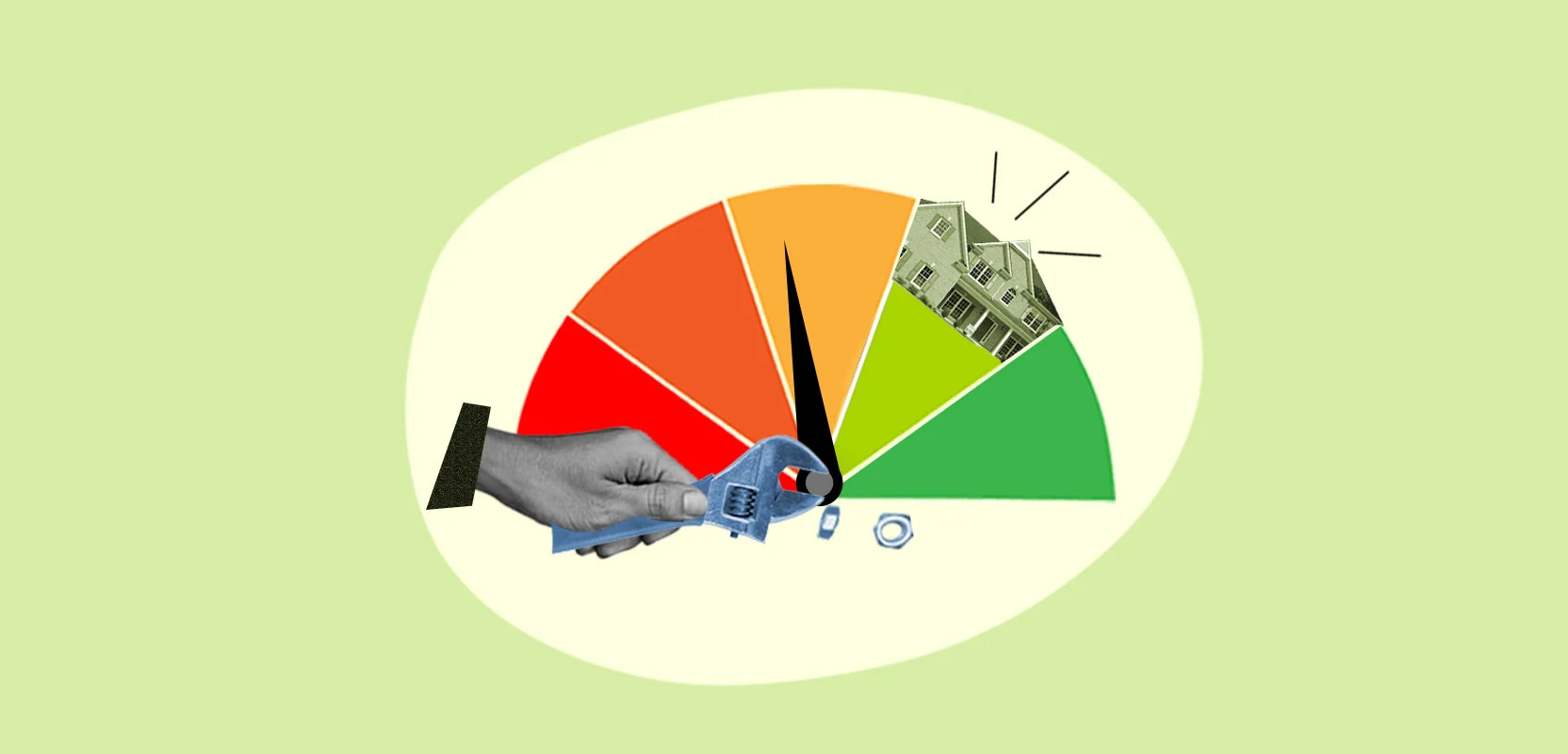To raise your credit score, follow these simple steps. In general, paying off balances and starting to make payments on time each month is the most well-known way to raise your score. Here are some steps you can take to improve your credit score in six months if you need to quickly raise it in order to purchase your first home.
You don’t need to have excellent credit to buy a house. Only sufficient credit is required.
This article explains credit scores, how they work, what factors affect them and what don’t, as well as how to raise your score in order to buy a house.
Table of Contents
What Is Credit?
Credit in this context means a lender borrowing money and paying back the debt with interest. A credit card is the most popular way to establish credit. With a credit card, you are using the lender’s money, which you must return on schedule. If not, the interest will rise and your credit rating will decline.
What Is My Credit Score?
Your credit score is a numerical evaluation that shows a lender how trustworthy you are with loans. High credit scores demonstrate to creditors that you pay your debts on time and don’t take on more debt than you can handle.
Conversely, having a low credit score suggests you might be a credit risk. Lenders note that you might occasionally miss payments, frequently overuse your credit limit, have a young account, or have erratic spending patterns.
How Are Credit Scores Calculated?
Calculations used to determine credit scores are based on how much a person has borrowed previously and how well they have paid their debts.
Businesses have different approaches to credit scores. Credit scores in the context of mortgages indicate the likelihood that a homeowner will repay a lender on time over the following 90 days. The reason why 90 days are important is that lenders reserve the right to reclaim a home after that time period if payments are not made. The foreclosure procedure is a legal one.
The mortgage credit score algorithm generates a numerical output ranging from 300 to 850, where 300 denotes the highest risk of non-payment and 850 denotes the lowest risk.
Credit scores are categorized by number by lenders.
- Excellent credit is 740 or higher
- Good credit is between 680 and 739
- Average credit is between 580 and 679
- Below-average credit is between 500 and 579
- Poor credit is below 500
Home buyers need to have a credit score of at least 500 in order to be approved for a mortgage.
What Factors Are Considered In Credit Scores?
A credit score is composed of more than 50 different factors, which are divided into five categories.
- Your payment history
- Your track record
- Your experience with different credit types
- Your recent attempts to secure more credit
- Your borrowing habits
Each category is given a different weight in the credit score formula, and recency is also given weight. Because recent events have a better ability to predict future events than those that occurred in the past, they have a greater impact on scores than those that occurred two years ago.
So starting today and waiting to develop good credit habits is the best way to raise your credit score.
Your credit score will significantly improve in the following six months.
Important characteristics like the following have no impact on credit scores:
- age
- gender
- race
- religion
- salary
- job history
- criminal record
- receive public assistance
- medical history
- political affiliation
- employer
- national origin
- marital status
- criminal record
Anybody can achieve perfect credit because credit scores are only determined by merit.
How Can I Find My Credit Score?
You are entitled to one free credit report pull each year from each of the three major credit reporting bureaus under the Fair Credit Reporting Act (FCRA).
A free credit report is also yours if you’re unemployed and intend to look for work soon, receive government assistance, suspect that someone has stolen your identity or credit, or any of these situations apply to you.
7 Ways To Fix Your Credit Score Within 6 Months
Experian, TransUnion, and Equifax are the three largest credit bureaus in the United States. The weightings used in the three bureaus’ versions of the credit rating formula differ slightly.
Their models are private, but thanks to patent applications and open data, we have a solid understanding of what makes a credit score strong and how to raise it.
1. Get Current With Your Bills
Why it works: 35% of your credit score is based on your payment history.
Your payment history is a record of the debts you have previously repaid to lenders, lessors, and credit card companies. The best payments are those that are made on time, but damage from an occasional 30-day late payment is minimal. 60-days late or longer, and bills in the collection are more damaging.
How to improve: Get your bills current, then make on-time payments each month after that. You’ll see an improvement in your credit score after three months. Your score can almost entirely improve after six months. Prioritize your debt payments by making your minimum credit card, auto, and student loan payments first, if necessary. After that, settle the remaining balance on all of your credit card bills.
2. Refrain From Opening New Credit Cards
Why it works: 10% of your credit score is affected by new credit.
The new credit accounts you or another person opened in your name are considered new credit. Credit cards, student loan refinancing, and auto loans and leases all count as new forms of credit. Additionally, store credit cards that offer 10% off at the register are included. Because it makes users less able to pay other bills, credit bureaus view new credit negatively.
How to improve: In the months before you buy a home, refrain from applying for new credit using your social security number. Pre-approvals are accepted as a necessary step in the purchasing of a home and barely affect your credit score. It’s risky to use new credit and store charge cards.
3. Raise Your Credit Limits
Why it works: Your credit score includes the amount owed as 30%.
The ratio of available credit to credit being used is determined by the amount owed. There is no dollar amount; it is a percentage.
Being “maxed out” means you have used all of your credit.” Consumers who use less than one-third of their available credit are preferred by the credit bureaus. A credit utilization rate of more than 50% can lower your rating.
How to improve: Your credit utilization ratio declines with higher limits. First, pay down your individual credit card balances until you’re using less than one-third of your available credit limit on each card.
Then get in touch with the companies that issue your credit cards and ask for a higher credit limit. When prompted, say no to having your credit score checked as part of the raise and agree to accept whatever new limit you are given.
4. Keep Existing Credit Accounts Open
Why it works: Your credit score is 10% of your mix of consumer loans.
Your credit history is made up of a mix of consumer credit accounts. The various forms of credit include credit cards, mortgages, auto loans, student loans, and personal loans. As part of your overall credit profile, the credit bureaus look at your mix of consumer credit to determine how you handle various account types. By keeping your other accounts open, you’ll naturally keep a healthy mix of credit.
How to improve: Even after a credit card balance is zero, your work isn’t done. Keep the credit line open, use it sparingly each month, and settle the balance in full when the bill comes in.
You can compel your creditor to inform the bureaus that you took out a loan and promptly paid it back by paying as little as $5 each month. It’s preferable to do this to close the account and let it expire or open new accounts.

5. Start A Credit Builder Account
Why it works: You may occasionally need assistance building your credit.
To regain control over their credit score and reporting, consumers can use Credit Builder companies. Companies called “Credit Builders” help people build their credit history by increasing the number of successful borrowing transactions.
How to improve: One of the biggest businesses for establishing credit is the self. inc.
6. Fix Your Credit Report Errors
Why it works: Your credit score may be reduced by up to 100 points as a result of errors on your credit report.
A recent Consumer Reports study found that one-third of U.S. consumers have errors in their credit reports which harm their credit scores. Although they can be related to criminal activity like identity theft, common mistakes like the following are more frequently found in credit reports:
- A credit card company isn’t reporting your credit limit
- A paid-off student loan still says it’s active
- A charge card reported a late payment by mistake
How to improve: When your mortgage is pre-approved, you’ll receive a copy of your credit report. Your credit won’t be impacted by this. Instead, it can assist you in identifying errors. Take a look at the data and implement the necessary corrections. Most errors are simple to fix online.
Discover more information on how pre-approvals for mortgages impact credit scores.
7. Be Patient
Why it works: 15% of your credit score is determined by your credit history.
The average number of years that you have managed your credit accounts is your length of credit history. More information is contained in credit histories that are longer, making them more accurate predictors of future behavior. Because they lack experience, consumers with recent credit histories rarely achieve extremely high credit scores.
How to improve: Time is the only thing that can truly increase the length of your credit history rating. Even after you’ve paid them off, you can still help yourself by keeping old credit accounts open. Make at least one purchase each month on your active, dormant credit cards. Even $5 worth of purchases is advantageous.
Which Credit Score Is Sufficient To Buy A House?
500 is the minimum credit score required to buy a home and mortgage it. A buyer’s options for borrowing grow as their credit scores rise.
The minimum credit score requirements for the four government-backed loans are, in accordance with official mortgage guidelines:
- Conventional Mortgage: 620 credit score
- FHA mortgage: 500 credit score
- VA mortgage: 580 credit score
- USDA mortgage: 620 FICO
98% of first-time home buyers use government financing. The remaining 2% are financed through Jumbo Mortgages or some other type of non-government loan, neither of which have a minimum credit score requirement.
Jumbo loans typically demand a higher credit score than a loan that is backed by the government.
How Long Does it Take to Build Credit to Buy a House?
Most buyers of homes can repair their credit in just six months in order to purchase a home. Scores continue to rise with each subsequent month.
Your credit score can go as high as you want it to. Both your spending and our credit history, account ages, and credit mix are under your control.
Repairs may be more challenging for buyers with judgments, liens, or significant delinquencies, but they are still effective. Customers who have several tradelines can anticipate a rapid credit buildup. Consumers without much credit history might require a little more time. But in every instance, two years will do.



